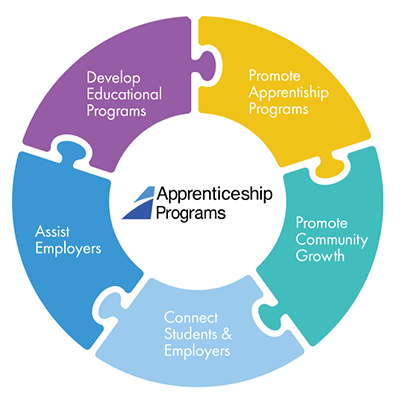Community College Sponsored Apprenticeships Fill the Talent Pipeline without all the Paperwork
In January, students will be sitting down for their first class of Supply Chain Management 101, part of the curriculum of the newly launched Logistics/Supply Chain Management Registered Apprenticeship program at Harper College in Palatine, Illinois. The next day, the students will go to work where they will start applying their classroom-acquired knowledge to the real-world applications provided by the companies that employ them.
In the spring of 2019, these students will graduate with an Associate of Applied Science (AAS) degree in Manufacturing Technology with a specialization in Supply Chain Management – Logistics. Additionally, they will have acquired up to seven industry recognized credentials earned through the Council of Supply Chain Management Professionals (CSCMP) and a Department of Labor (DoL) certification that they are fully qualified for their occupation. At the same time, the companies, having paid the students’ wages and tuition throughout this process, will gain highly qualified employees ready to hit the ground running with a specialized understanding of how the principals are applied at their organization.
“It’s win-win-win,” said Melissa MacGregor, Manager of Workforce Grants at Harper College. “The students get training and certification and have no debt when they graduate. The companies get young employees with the skills the company is specifically seeking. And, the community colleges create partnerships with industry and attract more students that they wouldn’t otherwise have enrolled; very desirable students, who stay for the duration and complete what they’ve started.”
Apprenticeship is a proven talent development strategy that answers the skills gap, builds loyalty, reduces turn-over rates, and helps increase productivity, according to Dr. Rebecca Lake, Dean of Workforce and Economic Development at Harper College. It works particularly well, Lake points out, when an employee who is nearing retirement is assigned as a mentor to an apprentice. The two-to-three-year timeframe of an apprenticeship allows that important knowledge transfer to take place before the older employee is lost to retirement.
Further, according to Lake, community colleges are uniquely positioned to streamline apprenticeship programs.
“Typically, companies who wish to bring on apprentices as part of their talent pipeline development, can become registered apprenticeship sponsors. But, there is a lot of paperwork and, chances are, they will still need someone to do the training. That will often be a local community college, provided the needed course is currently being offered,” said Lake.
What makes the Harper College program different is that, as one of only three community colleges in the country that are registered program sponsors, they can develop the curriculum and aggregate all the students from all the companies in their district to fill a classroom. “Most companies can only spare one or two employees at once to take time out of their work week to attend classes. We can assemble a class with 20 apprentices by pulling students together from 15 or more businesses,” said Lake.
Classrooms filled with students who are working at different companies in a variety of industries have the added benefit of allowing students to share and learn from each other’s real-world experiences through classroom discussion.
Because Harper College is the program sponsor of the apprenticeship programs that they offer, companies never have to handle any of the DoL paperwork. The college manages all of the compliance issues and registration paperwork. Companies can also work with Harper to develop programs specifically geared to meet the demands of their highly skilled workforce. Harper’s program is a fully accredited AAS degree that is transferrable to a number of universities, if desired by the apprentice.
To participate, companies are responsible for hiring a candidate for the program and allowing them release time to attend classes. A mentor at the company is also provided who confirms that the apprentice has gained the required competencies through on-the-job learning. To aid in this, Harper College provides mentors with easy checklists of the competencies required as well as a Train the Trainer program. Mentors attend a four-session series of workshops to help them become comfortable with their new role. This series is interactive and offers guidance on such topics as providing feedback and setting goals.
Apprenticeship programs are ideal for companies that are struggling to acquire and retain talented employees. “I would encourage companies to reach out to their local community college to see about starting a similar program in their area,” said Lake.
In Illinois, companies interested in hiring apprentices can partner with the college by contacting the Harper College Office of Apprenticeships at (847) 925-6630 or sending an email to apprenticeships@harpercollege.edu. There are still openings in the Logistics / Supply Chain Management program for the spring 2017 semester.
To help other community colleges create their own registered apprenticeship programs, Harper College hosts accelerator programs. There is an informational breakfast meeting on Tuesday, October 4th. To learn more or to register, click here.
| This story is from our regular series of articles highlighting efforts being made here in the Midwest to address transportation workforce issues. We’d like to tell your story, too. Click here to fill out our simple form to get the ball rolling. We know there are great efforts being made across the region. Let’s share our successes! |

